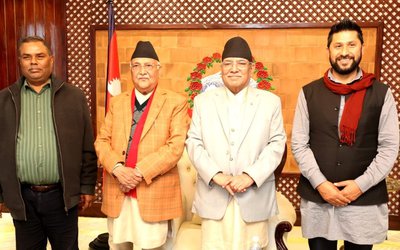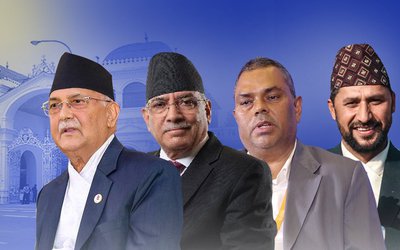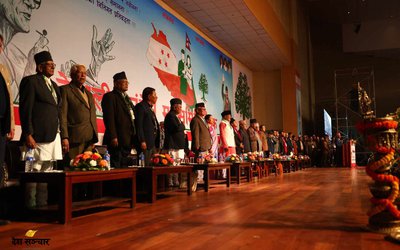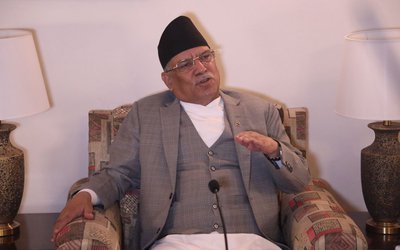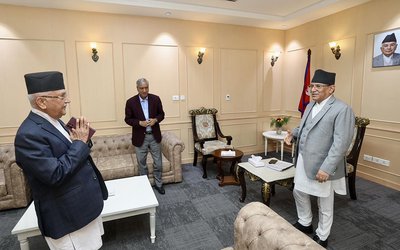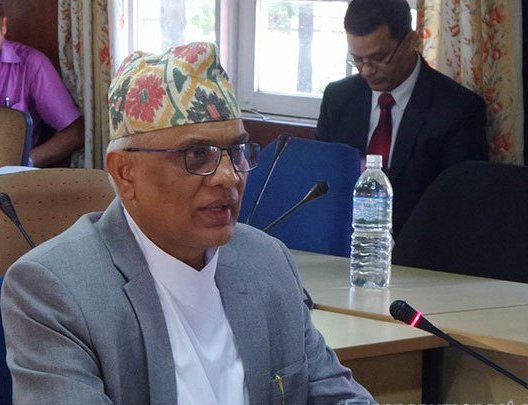
Nepal’s judiciary has a proud history. Judges had, at times, overruled decrees by kings. But crucial decisions, one after the other, by the overenthusiastic new political bosses, have hurt its independence.
The euphoria over the successful conduct of the polls, the first under the new constitution, is the fast giving way to anarchy and confusion. Last Wednesday, abuses were hurled at the sitting Chief Justice, Gopal Prasad Parajuli, during a hearing before a division bench of Nepal’s Supreme Court. He was accused of being corrupt and of faking his academic qualifications and age to get the top job. After a two-day hearing in a contempt of court case, the bench let go Gobinda K.C. on ordinary bail. But they called for proof of CJ Parajuli’s academic qualifications and age (citizenship certificate) — something the parliamentary committee and the judicial council had vetted while confirming him to the post.
Baburam Bhattarai, the former prime minister who had advocated a judiciary answerable to the legislature when he was in the Maoist Party, and Gagan Thapa, a former minister from the Nepali Congress expressed their solidarity with K.C., barely 100 meters from the Supreme Court where the case was about to be heard. While the case is still “subjudice”, the loss of the Supreme Court’s credibility was foretold. This is an outcome of the romantic approach of the political actors running the country since 2006 when Nepal began its radical political experiments. The judiciary has been reduced to becoming an extended unit of the political parties, with several of their cadres occupying the chairs of Sriman (the lordship). The decline in its quality, fairness, and credibility is palpable.
Nepal’s judiciary has a proud history. Judges had, at times, overruled decrees by kings. But crucial decisions, one after the other, by the overenthusiastic new political bosses, have hurt its independence. Soon after suspending the monarchy in April 2006, the new regime, a conglomerate of the Nepali Congress, Communist Party of Nepal-Unified Marxist Leninist, Maoists, and Madhesi groups, asked all sitting judges to take a fresh oath as proof that they were no longer loyal to the king, but to the new government. There was no protest from the judges.
The new regime also introduced the system of hearing by an all-party parliamentary committee for their confirmation. But this has become nothing more than a ritual since each big party is allotted a quota for the judges’ posts. Not only the judiciary, but all constitutional bodies including the election commission, public service commission, and the anti-corruption constitutional body, Commission of Inquiry into Abuse of Authority and diplomatic appointments have been made on the same basis. This is generally known as the “politics of amsabanda” (sharing of powers and privileges by political parties). In fact, the one institution the new political regime wanted to demoralize even before the judiciary was the Nepal army, suspecting that it was loyal to the monarchy. But as the army resisted the move towards its total restructuring, as advanced by the UN agencies and Western donors associated with the peace process, the new regime turned its attention towards the judiciary.
The fear of the political masters was so visible amongst judges that they chose not to take up cases that challenged the way the “Constitution of the Kingdom of Nepal, 2047” had been repealed. The
oath of loyalty that the judges took towards the new regime made them different from the previous lot. “During the King’s direct rule, a full bench of the Supreme Court headed by then CJ Min Bahadur Rayamajhi dismissed a commission to investigate corruption at the highest level calling it unconstitutional and the order was executed within five hours,” recalls a former Supreme Court judge.
"Neither the king nor anyone else doubted the fairness of the judiciary”. It is not only the political parties and the executive but also the media in general and the civil society that have endorsed interference in the judiciary — explicitly or tacitly. In 2012, the judiciary suffered another blow. The major political parties — the Nepali Congress, UML and Maoists and Madhesi groups — under advice from Indian authorities, first, and then after being counseled by the UN and representatives of western diplomatic missions, approached sitting CJ Khilraj Regmi to head the government which would have representatives from four political parties. This government was to conduct elections to the second constituent assembly since the first one had failed to draft the constitution. The international community openly advised political parties and the people, in general, to cooperate with the new government in the successful conduct of the poll.
The Supreme Court just sat on a series of cases challenging the appointment of its head as the prime minister. It ignored the fact that such a step would infringe upon the principle of separation of powers. Much after Regmi retired from the CJ’s post and ceased to be the prime minister, the Supreme Court ruled that the appointment was “unconstitutional”. But the damage to the court’s independence had been done. And it hasn’t been reversed so far. It is doubtful if the political parties will be able to undo the rot in the judiciary. It will require a far more comprehensive approach that will involve restoring the credibility of all the other organs of the state as
well.
Courtesy: Indian Express

Yubaraj Ghimire
Ghimire is a Kathmandu based journalist.
- Why ‘Revolutionary’ Communist PM Prachanda Went To Temples In India
- Jun 08, 2023
- Why China Is Happy With Nepal’s New PM
- Jan 03, 2023
- Prachanda Sworn In As PM: New Tie-ups In Nepal, Concern In India
- Dec 27, 2022
- Young TV Anchor As Its Face, RSP Rise Takes Nepal By Surprise
- Nov 23, 2022
- Nepal Votes, Why The Verdict May Not Make New Delhi Very Happy
- Nov 23, 2022


